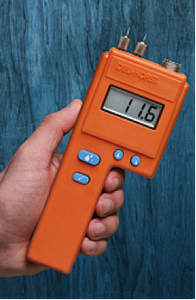 Contractors have many responsibilities in their job. Making sure that every detail of their work is completed without complications is a huge part of what separates top-rank contractors from the rest. To make sure that the installation of many different building materials has been completed without complications, many contractors employ moisture meters to monitor the moisture content (%MC) of various building materials, such as concrete or hardwood flooring.
Contractors have many responsibilities in their job. Making sure that every detail of their work is completed without complications is a huge part of what separates top-rank contractors from the rest. To make sure that the installation of many different building materials has been completed without complications, many contractors employ moisture meters to monitor the moisture content (%MC) of various building materials, such as concrete or hardwood flooring.
Why do contractors rely on these handy little devices for verifying their work? Here are a few reasons why:
1: Moisture Meters are Easy to Use
Moisture meters are portable devices that a contractor can carry with them on the job and use to get a reading of the %MC of a material within seconds. With the push of a button, a moisture meter can provide a quantitative reading for moisture in wood or any other materials that the meter has been calibrated for.
For materials that the meter has not been calibrated for, many moisture meters have a reference scale setting that allows users to take a reading of a sample of dry material to compare to other samples of that same kind of material throughout the jobsite. Through this comparison, users can quickly determine if the moisture content of a material is above or below normal.
2: To Protect a Good Reputation
Beyond being easy to use, moisture meters are a great way to protect a professional’s reputation. By using moisture meters on the job site and documenting reading results, contractors can verify that their materials were free of moisture-related problems before, during, and after installation. The documented data can later be used to show that they contractor’s decisions regarding the installation of materials was made based on a sound, reliable analysis of the conditions of said materials.
3: To Avoid Callbacks
By verifying the moisture content of materials and taking appropriate measures as needed, contractors can avoid complications such as the cupping, warping, or buckling of flooring wood, mold growth, and many other problems caused by excess moisture in building materials.
When moisture is left unchecked in building materials because it went undetected, the above problems can be cause for the client to demand the contractor to come back and redo the installation. If it is found that the contractor did not do enough to make sure that moisture would not cause an issue, the contractor may have to pay for the re-installation of materials out of pocket, which brings us to our next reason contractors use moisture meters…
4: To Stay on Budget
One of the worst things about callbacks is that they can get expensive very quickly. While moisture meters help to prevent callbacks, which can nearly double the cost of doing a job, there are other ways in which moisture meters can help you stay on budget.
For example, say that some of your building materials are moisture-compromised. If you catch the problem early enough by using a moisture meter, it may be possible to remediate the moisture problem and salvage the material rather than having to throw it out and replace it entirely.
Also, because using moisture meters is generally faster than other methods for checking moisture in building materials, you save on labor costs by using these devices over slower testing methods.
5: To Follow ASTM F-2170-11 Standards
 For concrete installations, monitoring the moisture content of a concrete slab is absolutely critical to predict how that slab will behave when other things are built on top of it. If a concrete slab isn’t ready and other flooring is installed over it, the excess moisture in the concrete can cause problems later on.
For concrete installations, monitoring the moisture content of a concrete slab is absolutely critical to predict how that slab will behave when other things are built on top of it. If a concrete slab isn’t ready and other flooring is installed over it, the excess moisture in the concrete can cause problems later on.
To test concrete according to the ASTM F-2170-11 standard, contractors have to use a thermo-hygrometer with an in-situ probe. This method gives contractors a solid idea of the moisture conditions deep within a slab.
Overall, moisture meters (and thermo-hygrometers) are highly useful tools for contractors on the go, combining accuracy, speed, and ease of use as a testing method in one convenient package.
Learn more about how contractors use moisture testing devices in our free flooring eBook using the link below:

Comments